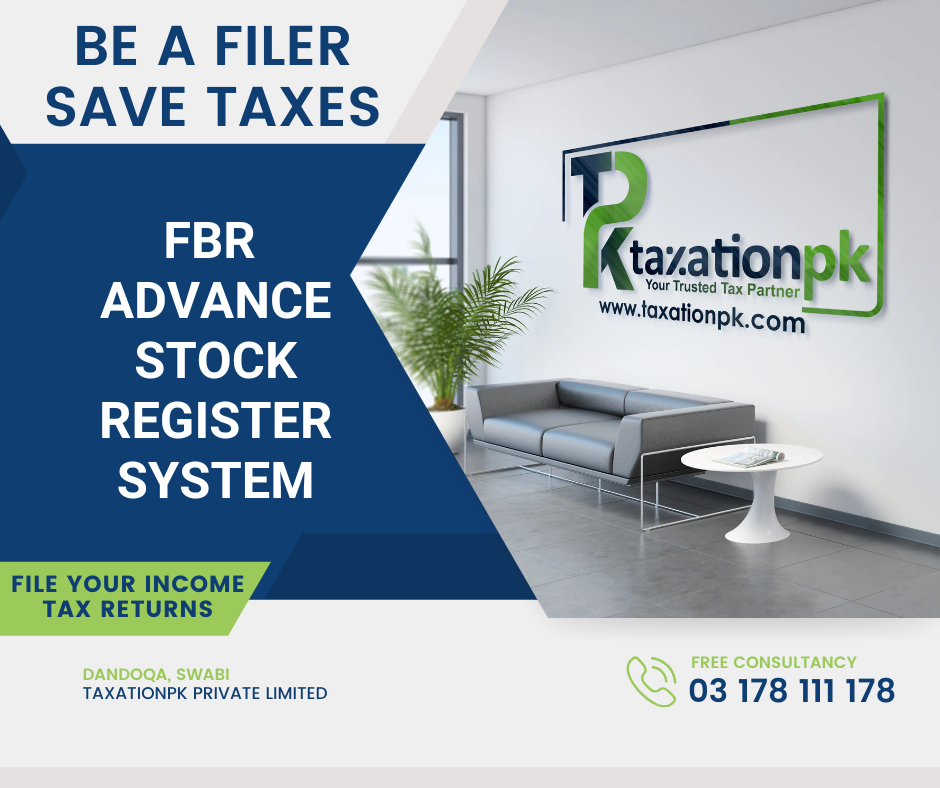Table of Contents
Toggle1. Overview of the Advanced Stock Register System
The Advanced Stock Register System is embedded within Information Center 2.0—a powerful digital platform that serves as a central data repository and a management information system (MIS) for the FBR. By enabling tax officers to retrieve in-depth stock records, the FBR aims to facilitate precise tax assessments and reduce instances of tax evasion.
2. How the Stock Register System Works
The Stock Register is designed as a comprehensive data management tool, giving tax officers the ability to monitor taxpayer stocks and related transactions. The platform tracks essential details, such as:
- Stock Movements: The system meticulously records every transaction, capturing key details like quantity, valuation, and transaction dates. This enables tax officers to have a clear view of stock inflow and outflow, which is essential for accurate tax assessments.
- Tax Filing History and Summaries: The Stock Register integrates a detailed history of Income Tax and Sales Tax filings. Tax officers can access summaries that provide insights into a taxpayer’s historical compliance behavior.
- Comparative Analysis: By comparing tax declarations against reported stock movements, tax officers can easily identify discrepancies that might indicate tax evasion or underreporting.
This centralized access to stock data makes it easier for tax officers to verify compliance with tax regulations. It also minimizes errors that may occur due to inconsistent or incomplete data sources, thereby enhancing the accuracy of tax enforcement.
3. Enhanced Data Access Through Information Center 2.0
Information Center 2.0 acts as the backbone for the new Stock Register System. This platform integrates a variety of data sources, including:
- Sales Tax Annexures: These documents provide detailed breakdowns of transactions subject to sales tax.
- Customs Import Data: Information on imports, including goods, valuations, and duties paid, is crucial for verifying the accurate reporting of imported stock.
- Withholding Reports: For taxpayers involved in transactions as withholdees or withholding agents, Information Center 2.0 consolidates relevant reports to ensure complete tax oversight.
By aggregating this data into a single platform, Information Center 2.0 creates a holistic framework for tax administration.
4. Fostering Transparency and Taxpayer Compliance
One of the primary goals of the Advanced Stock Register System is to establish a transparent and secure digital ecosystem that promotes compliance. With its real-time tracking capabilities, the system ensures that tax officers have access to current and comprehensive data on taxpayers’ stock activities.
Additionally, the system allows for thorough reporting, with tax officers able to generate compliance reports based on reliable data. This is expected to reduce the instances of tax fraud and inaccuracies, ultimately leading to increased revenue for the national exchequer.
5. Benefits for Tax Administration and the Broader Economy
The launch of the Advanced Stock Register System is expected to have several positive impacts on both the tax administration process and the broader economic landscape:
- Improved Revenue Collection: By reducing tax evasion and improving compliance, the system enables the FBR to capture a larger share of owed taxes, which can be reinvested into national development.
- Enhanced Business Environment: Transparent tax administration builds trust between businesses and regulatory bodies. This can promote a more compliant and cooperative business environment, making Pakistan more attractive for investment.
- Strengthened Regulatory Compliance: The system allows for better oversight of regulatory adherence, particularly concerning IT and ST laws. This ensures that businesses comply with relevant tax laws, reducing legal risks and ensuring a level playing field.
6. Future Prospects and Potential Expansions
The Advanced Stock Register System reflects FBR’s commitment to modernization, but it also lays the groundwork for further enhancements. In the future, the system could be expanded to incorporate additional functionalities, such as:
- Automated Tax Assessments: By leveraging data analytics and AI, the FBR could automate parts of the tax assessment process, making it faster and more accurate.
- Enhanced Data Sharing Across Government Agencies: Collaboration with other regulatory bodies could enable FBR to cross-check data from different sources, increasing accuracy in tax assessments.
- Integrating Advanced AI and Machine Learning Models: These technologies could be employed to analyze patterns of compliance and identify potential tax evaders proactively.
Conclusion
This initiative is likely to have far-reaching effects on Pakistan’s tax landscape, supporting the government’s broader goal of improving economic management and revenue collection. Through a balanced approach of digital innovation and regulatory oversight, FBR’s Advanced Stock Register System stands as a model for modern tax administration that fosters transparency, compliance, and economic growth.







